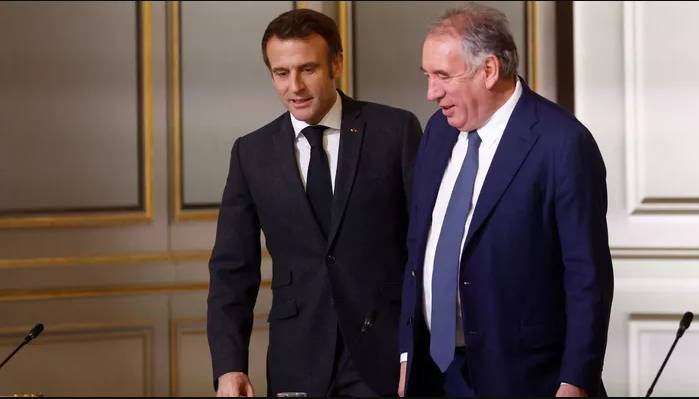Macron nominates centrist ally Bayrou as France's new PM

Stay tuned with 24 News HD Android App

President Emmanuel Macron on Friday named centrist leader Francois Bayrou as prime minister, handing him the daunting task of hauling France out of months of political crisis.
Bayrou, the 73-year-old head of the MoDem group which is allied to Macron's party, was appointed nine days after parliament ousted Michel Barnier's government in a historic no-confidence vote following a standoff over an austerity budget.
"The President of the Republic has appointed Mr. Francois Bayrou as prime minister and tasked him with forming a government," the French presidency said.
Bayrou's appointment immediately sparked criticism, with the hard-left France Unbowed (LFI) party and the Greens threatening to back a new motion of censure.
Bayrou is the sixth prime minister of Macron's mandate after last week's toppling of Barnier, who became France's shortest-serving prime minister and lasted only three months.
He is also Macron's fourth prime minister of 2024.
Bayrou now faces an immediate challenge in putting together a cabinet that can survive a no-confidence vote in a divided parliament and thrash out a 2025 budget in a bid to limit economic turmoil.
Dialogue
The announcement was made after Macron received Bayrou for nearly two hours of talks Friday. BFMTV reported the talks with Bayrou had been "tense".
Barnier, 73, was expected to hand over power to his successor at a ceremony Friday afternoon.
A red carpet was rolled out and microphones installed in the courtyard of the Matignon, the seat of the French government.
The new cabinet is expected to be revealed at a later date.
Bayrou will be tasked with having dialogue with all political forces except the far-right National Rally (RN) and hard-left LFI parties "in order to find conditions for stability and action," a member of Macron's team said on Friday.
"François Bayrou's name emerged in recent days as the most consensual."
Both the RN and LFI parties had joined forces last week to topple Barnier's government.
Macron has been confronted with the complex political equation that emerged from snap parliamentary elections this summer -- how to secure a government against a no-confidence vote in a bitterly divided lower house where no party or alliance has a majority.
Both LFI chief Jean-Luc Melenchon and RN parliamentary leader Marine Le Pen, who emerged as kingmaker after the summer elections, had not been part of the most recent talks.
'Poor France'
Le Pen suggested that Bayrou's appointment might lead to new deadlock.
"We are asking him to do what his predecessor was unwilling to do: listen to the opposition and build a reasonable, well-considered budget," she said on X.
The left-wing New Popular Front (NFP), which was put together to prevent the far-right from coming to power, emerged as the largest bloc in the National Assembly after the elections.
Bosses of the NFP alliance that includes the Socialists, Communists and Greens as well as the LFI had demanded that Macron appoint a prime minister from their ranks.
The members of Melenchon's hard-left party threatened to table a new motion of censure.
"It's yet another insult to democracy," Manuel Bompard, a senior LFI lawmaker, said on X. "To topple Bayrou is to topple Macron."
More moderate left-wingers were also unhappy. "Poor France," Green Party chief Marine Tondelier said on X.
She told BFMTV that her lawmakers would have "no other choice" but to censure Bayrou's government if it does not change its economic policy and keeps hardliner Bruno Retailleau as interior minister.
Communist party leader Fabien Roussel said Bayrou's appointment was "bad news," adding the left had demanded a "change of political direction."
There had been expectations Macron would announce Barnier's successor in an address to the nation last week.
But in a sign of the stalemate, Macron did not name Barnier's successor then and missed a 48-hour deadline he gave at a meeting of party leaders on Tuesday.
The candidacy of Bayrou had raised hackles on the left -- wary of continuing the president's policies -- as well as on the right, where he is disliked by influential former president Nicolas Sarkozy.
Beyond Bayrou, prime ministerial contenders included former Socialist prime minister Bernard Cazeneuve, Defence Minister Sebastien Lecornu, a Macron loyalist, and former foreign minister Jean-Yves Le Drian.
Opinion polls have indicated the public is fed up with the crisis, with just over two-thirds of respondents to an Elabe poll published on Wednesday saying they wanted politicians to reach a deal not to overthrow a new government.
